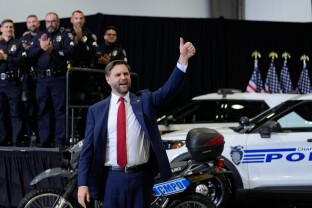Vice President JD Vance blamed Democrats “soft-on-crime” policies for the death of Iryna Zarutska, the Ukrainian woman fatally stabbed on a Charlotte, North Carolina, commuter train earlier this year.
It’s one of the latest instances of Republicans politicizing the killing, which received national attention after law enforcement released a video of her death. Decarlos Brown Jr. was immediately arrested as a suspect and was charged with committing violence on a mass-transportation system by the Department of Justice — which carries a potential death sentence — and first-degree murder in state court. His past criminal record caught the attention of Republicans, who have even campaigned on it.
“She came from a war-torn country, sought shelter in the United States, and because of soft-on-crime policies she was murdered here and not in the war-torn country she came from,” Vance said, speaking to a crowd Wednesday in Concord, North Carolina. “Isn’t that a disgrace?”
Vance said the number of times Brown had been arrested and released was unacceptable.
“They (law enforcement) did everything that they could to keep this thug off the streets. And it was the political leadership that failed,” Vance told Wednesday’s crowd. “I think every politician who didn’t work hard to keep violent criminals behind bars deserves to have some of the blame, but at the very top of that list is Governor Cooper, because at the time that we were pushing these soft on crime policies, Governor Cooper was the man in charge.”
Several independent news organizations, including the Poynter Institute’s PolitiFact, have argued the claims against Cooper are false as he was not in the governor’s role during Brown’s criminal history.
A spokesperson for former Gov. Roy Cooper, who left office in December 2024 and is now running for Senate, noted that his opponent in the 2026 race, former Republican National Committee Chair Michael Whatley, has struck a similar tone to Vance in his campaign against Cooper.
“Roy Cooper is the only candidate who spent his career prosecuting violent criminals and keeping thousands of them behind bars as attorney general, and signing tough on crime laws and stricter bail policy as governor,” the statement said.
Vance urged North Carolina’s Democratic governor, Josh Stein, to sign the state’s Republican-backed bill dubbed “Iryna’s Law,” which was passed by the state House of Representatives on Tuesday and sent to the governor’s desk. The legislation would overhaul cashless bail, allow magistrates to involuntarily commit those they deem to be suffering from mental illness and open the door for the use of the death penalty.
Stein’s office did not respond to an inquiry from NOTUS asking if he planned to sign the legislation.
In recent interviews with NOTUS, Republican senators echoed Vance’s attack on “soft-on-crime” policies. North Carolina Sen. Ted Budd said he’d be happy with “whatever it takes” to make Charlotte safer. The deadly stabbing also got plenty of attention from the White House in recent weeks, with officials including FBI Director Kash Patel and press secretary Karoline Leavitt weighing in.
The vice president in his speech also acknowledged the one-year anniversary of Hurricane Helene. Vance said President Donald Trump had spoken with Stein earlier this month about continued disaster relief. The Department of Homeland Security last week announced a $64 million investment in North Carolina disaster relief, combined with an additional $48 million announced on Sunday, but Stein has been critical of the Federal Emergency Management Agency’s response time after last year’s hurricane, saying at an August press conference that the federal government “has not met the moment.”
“We inherited, I’m going to be honest with you, a FEMA that was mired in bureaucracy and red tape,” Vance said Wednesday. “The president has made it very clear from Day 1: We want to get relief to the people of North Carolina as quickly and as rapidly as humanly possible, and that’s what we’re trying to do.”
NOTUS reported this week on more than a dozen current and former staffers at FEMA saying the Trump administration has increased the level of bureaucracy at the agency. An example they pointed to was a policy requiring Homeland Security Secretary Kristi Noem’s approval on spending requests above $100,000, which they said has created a backlog.
—
Correction: This article has been updated to correct the day North Carolina’s state House passed its cashless bail law. It passed on Tuesday.
This story was produced as part of a partnership between NOTUS and The Assembly.
Sign in
Log into your free account with your email. Don’t have one?
Check your email for a one-time code.
We sent a 4-digit code to . Enter the pin to confirm your account.
New code will be available in 1:00
Let’s try this again.
We encountered an error with the passcode sent to . Please reenter your email.


